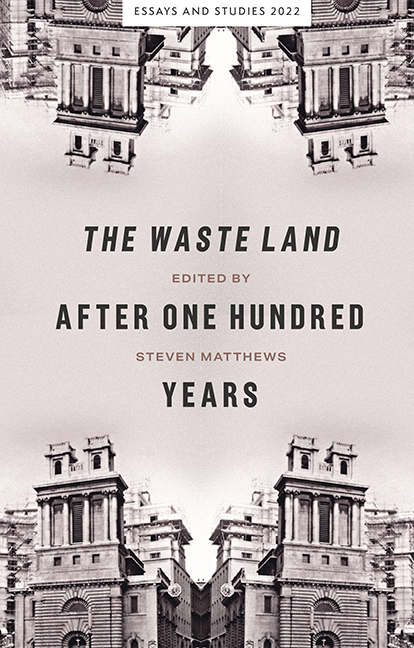Book contents
- Frontmatter
- Contents
- Notes on Contributors
- Introduction
- 1 A ‘Dangerous Model’: Resisting The Waste Land
- 2 Beyond the Sanskrit Words: Eliot and the Colonial Construction of Poetic Modernism
- 3 ‘An Icon of Recurrence’: The Waste Land’s Anniversaries
- 4 ‘O City, city’: Sounding The Waste Land
- 5 Lost and Found in Translation: Foreign Language Citations in The Waste Land
- 6 The Poetic Afterlife of The Waste Land
- 7 Compositional Process and Critical Product
- 8 Hypocrisy and After: Persons in The Waste Land
- Index
4 - ‘O City, city’: Sounding The Waste Land
Published online by Cambridge University Press: 08 October 2022
- Frontmatter
- Contents
- Notes on Contributors
- Introduction
- 1 A ‘Dangerous Model’: Resisting The Waste Land
- 2 Beyond the Sanskrit Words: Eliot and the Colonial Construction of Poetic Modernism
- 3 ‘An Icon of Recurrence’: The Waste Land’s Anniversaries
- 4 ‘O City, city’: Sounding The Waste Land
- 5 Lost and Found in Translation: Foreign Language Citations in The Waste Land
- 6 The Poetic Afterlife of The Waste Land
- 7 Compositional Process and Critical Product
- 8 Hypocrisy and After: Persons in The Waste Land
- Index
Summary
The centenary of The Waste Land is a good moment to register its continuing capacity to generate a shock of recognition and to think about the relationship between shock and recognition not only in relation to the poem's interpretation and reception, but also its form.
In Shadow and Act the African American writer Ralph Ellison gives a memorable account of the impact of Eliot's poem on him:
The Waste Land seized my mind. I was intrigued by its power to move me while eluding my understanding. Somehow its rhythms were often closer to those of jazz than were those of the Negro poets, and even though I could not understand them, its range of allusion was as mixed and as varied as that of Louis Armstrong.
What is striking is Ellison's re-framing of Eliot's allusive musicality in terms of Black America's greatest contribution to world music, jazz. In his The History of the Voice, the Caribbean poet Edward Kamau Brathwaite offers a different but complementary political angle on the poem's vocal sound. Brathwaite speaks of how in his time in the West Indies ‘mainstream poets who were moving from standard English to nation English were influenced basically by T.S. Eliot and John Arlott's cricket commentary on the BBC’. Since the publication of The Drafts of Eliot's poem, and the reconstruction of an Ur-version of the poem in Christopher Ricks and Jim McCue's monumental edition of The Poems, we are aware that the opening section of the poem was originally given the Dickensian title of ‘He Do the Police in Different Voices,’ and of the partly occluded American dimension of the text. It is the poem's openness to these different, non-standard voices and kinds of music that Brathwaite, like Ellison, values. It is not Eliot, the elite cultural policeman of After Strange Gods or the spokesperson for tradition, but Eliot the musical outsider with an ear for rhythm and the clashing and convergence of different vocal and lyrical registers within and across cultures. In a recent essay in Poetry on ‘How The Waste Land Sounds Now’, exploring contemporary American poets’ responses to Eliot, Lesley Wheeler observes that ‘Eliot persists as a sonic obsession more vividly than as a poet who levelled important arguments or shaped literary history’.
- Type
- Chapter
- Information
- The Waste Land after One Hundred Years , pp. 93 - 116Publisher: Boydell & BrewerPrint publication year: 2022



